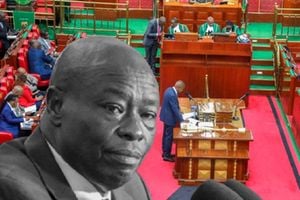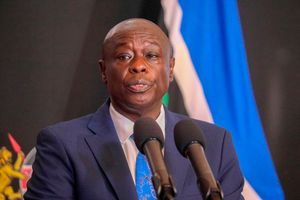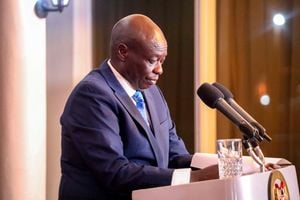
Deputy President Rigathi Gachagua addresses the media at his official residence in Karen, Nairobi, on October 7, 2024.
Had Deputy President Rigathi Gachagua opted to resign and avoid impeachment, he would have been in line to receive juicy lifelong perks including a monthly pension equivalent to 80 per cent of his last salary, a lump sum payoff equal to 12 months of his last salary, security, medical insurance and a diplomatic passport for him and his spouse.
Having chosen to fight back the impeachment proceedings, however, DP Gachagua will be sure to lose his salary should the Senate back his ouster by the National Assembly.
The monthly benefits would have come in addition to two saloon cars, a luxury four-wheel drive vehicle, three drivers and a fuel allowance equivalent to 15 per cent of the monthly pay of the serving Deputy President.
The vehicles would be replaced every four years, with taxpayers catering for their maintenance at top dealerships.
Still, a coterie of aides and support staff including one personal assistant, one secretary, one accountant, two housekeepers, two senior support staff, two gardeners, armed security and two cleaners would be at his disposal until his death.
Mr Gachagua is relying on courts and the Senate to save his high-flying political career after the National Assembly voted overwhelmingly in favour of removing him as deputy president over accusations of gross misconduct, corruption and violation of the Constitution.
Divisive politics
Lawmakers also accuse him of practising ethnically divisive politics and undermining the government, risking making him the first Kenyan deputy president to be impeached should the Senate support his dismissal.
The law also calls for the withdrawal of the benefits for State officers such as the deputy president who “act in wilful violation of the Constitution.”
On Tuesday evening, Speaker Moses Wetangula announced that 281 MPs had adopted an 11-charge impeachment motion, with 44 MPs voting against and one abstaining.
DP Gachagua is accused of acquiring properties through corrupt means. The wealthy vice president said most of the houses and land belonged to his late brother's estate.
However, many Kenyan MPs took to the parliamentary floor on Tuesday to blemish his reputation.
Mr Gachagua denies any wrongdoing in a row that follows his recent fallout with President William Ruto, who has not commented publicly on the impeachment proceedings.
The Senate will next week debate whether to dismiss Mr Gachagua.
Senate speaker Amason Kingi said the House would investigate the allegations against the Deputy President on Wednesday and Thursday.
If at least two-thirds of the senate, or 45 Senators, vote to uphold the impeachment, Mr Gachagua will be dismissed.
He will lose a monthly salary of Sh1.2 million and other perks, armed security, a multi-million shilling insurance cover and, more importantly, access and connections to inner sanctums of power.
But, in reality, Mr Gachagua is hardly short of cash.
Corrupt dealings
He is a wealthy public servant-cum-businessman-cum-politician who battled previous accusations of corrupt dealings to become President Ruto's running mate in a closely fought election in August 2022.
The impeachment motion lists 11 grounds for impeachment, including accusations that Mr Gachagua amassed unexplained wealth worth Sh5.2 billion in two years.
The 59-year-old politician, also known as “Riggy G”, has described allegations against him as "outrageous" and "sheer propaganda".
Read: A cornered Gachagua
In 1989, then vice president Josephat Karanja resigned from office when he faced a similar motion.
If Mr Gachagua had taken this path, his exit package would have cost the Kenyan taxpayer a lump sum pay of Sh8.64 million, Sh720,000 in monthly lifetime pay and a monthly fuel allowance of Sh108,000.
The state would also pay for his medical care and that of his family, and pay for his trips inside Kenya and abroad.
Former Prime Minister Raila Odinga and retired vice presidents Kalonzo Musyoka and Moody Awori are already enjoying the multi-million shilling benefits, underlining the burden of keeping former State officials comfortable in retirement.
The State eased restrictions on the Opposition leaders’ access to retirement benefits following the peace deal between President Uhuru Kenyatta and his rival, Mr Odinga, popularly referred to as “the handshake” of March 2018.
Besides the monthly pay, their pool of aides and maintenance of fully furnished offices set back taxpayers tens of millions of shillings.
Taxpayers spent Sh59.23 million to run Mr Musyoka’s office in the year that ended June and Sh43 million for Mr Awori's workplace. Mr Odinga’s office received Sh78.68 million.












